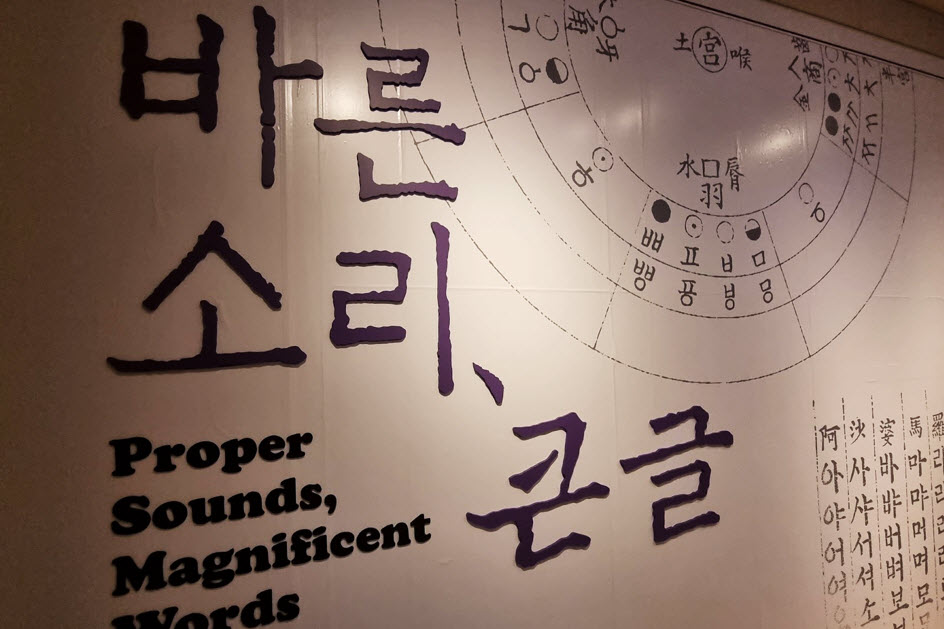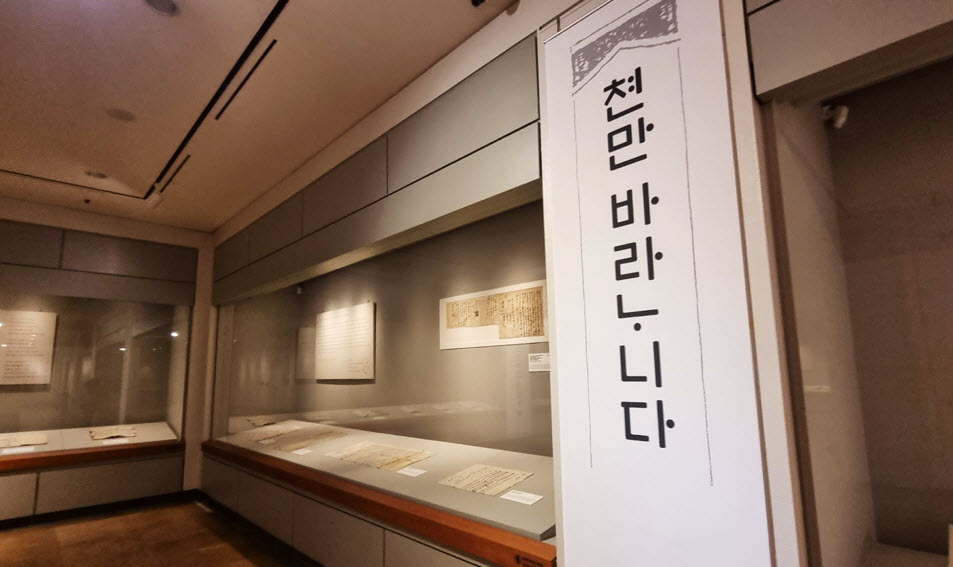On February 6, the special exhibition Proper Sounds, Magnificent Words opened at the Kyujanggak Institute of Korean Studies Exhibition Hall. The Kyujanggak Institute of Korean Studies on Gwanak campus possesses a large collection of historical records of significant academic value. The name Kyujanggak comes from the name of an institution built under the supervision of King Sukjong (1674~1720) for the purpose of storing writings and paintings of the past, with its role expanding during the reign of King Jeongjo (1776~1800). Today, Kyujanggak Institute of Korean Studies houses around 300,000 historical documents on subjects that include philosophy, religion, literature, lifestyle, and various other aspects of human life. It also functions as a research space and a museum. This special exhibition displays a variety of historical documents that show the history of Hangeul, the Korean alphabet, from its creation to its widespread proliferation. The exhibition consists of seven sections - “Making Hunminjeongeum,” “Education in Our Letters,” “Sending Messages in Our Letters,” “Singing in Our Letters,” “Lifestyles in Our Letter,” “Learning in Our Letters,” and “Earning the Name Hangeul.”

Exhibition Entrance
The exhibition begins with a collection of books related to King Sejong’s creation of an alphabet for the rendering of Korean words known as Hunminjeongeum, or “Correct Sounds for the Instruction of the People.” The Huminjeongeum of Sejong (Sejong Eoje Hunminjeongeum) translates the introduction of Hunminjeongeum, written in Chinese characters, into Hangeul. A Song of Dragons Flying in Heaven (Yongbieocheonga), the first document published in Hangeul, is a collection of poems wishing for the growth and prosperity of the Joseon dynasty. Throughout the Joseon era, efforts were made to record Buddhist and Confucianist principles in writing. Commentary on the Heart Sutra (Banyasimgyeong Sohyeonjeonggi) and The Illustrated Conduct of the Three Bonds (Dongguksinsok Samganghaengsildo) are records of Buddhist and Confucianist principles written in Hangeul compiled throughout the Joseon era. Problems in communicating the decrees of the king to the people were resolved through publishing documents in Hangeul. King’s Words of Caution to the People (Eojegyeongmineum) written by King Yeongjo to announce the prohibition of alcohol reflects this change.
The next section of the exhibition features literary works published in Hangeul. The establishment of Hangeul made it possible for delicate emotional expressions difficult to capture in Chinese characters to be communicated, leading to the spread of literature in Joseon society. Various Korean literary productions are displayed here, including A Collection of Music Pieces of Late Goryeo to Early Joseon (Akjanggasa), and the novel The Tale of Chunhyang (Chunhyangjeon). Specialized encyclopedias were also published to promote international and domestic expertise. Examples include Prescriptions for Preventing Epidemics (Ganibyeogonbang), a collection of medical prescriptions for treating infectious diseases, and A Grammar of Mongolian (Mongeo Noguldae), a textbook on the Mongolian language to educate future interpreters.

Special Exhibition hall
The last section of the special exhibition consists of historical records related to the use of Hangeul in mass media and government documents towards the end of the Korean Empire. A Register of Official Records (Chignyeongjonan) is a book that consists of edicts issued by the king. An intriguing section of this book stipulates the mixed use of Korean letters and Chinese characters in public documents. Korean letters were actively used following the edict and eventually became known as "Hangeul." Newspapers including Hwangseongsinmun and Dongnipsinmun are displayed here. In the permanent exhibition area, visitors can check other documents and artifacts stored at Kyujanggak Institute of Korean Studies. Materials listed on the UNESCO Memory of the World, including The Journals of the Royal Secretariat (Seungjeongwonilgi), Records of Daily Reflection (Ilseongnok), The Annals of the Joseon Dynasty (Joseonwangjosillok), The Royal Protocols of the Joseon Dynasty (Uigwe), and Records off Joseon Envoys to Japan are on display.
Proper Sounds, Magnificent Words will be on display through May 31. The Kyujanggak Institute of Korean Studies exhibition room is open to all free of charge from Monday to Friday 9:30 AM to 5:00 PM, and guided tours can be booked in advance on the website.
Written by Jimin Han, SNU English Editor, thatsmejimin@snu.ac.kr
Reviewed by Professor Travis Smith, Department of Asian Languages and Civilizations, tlsmith@snu.ac.kr

